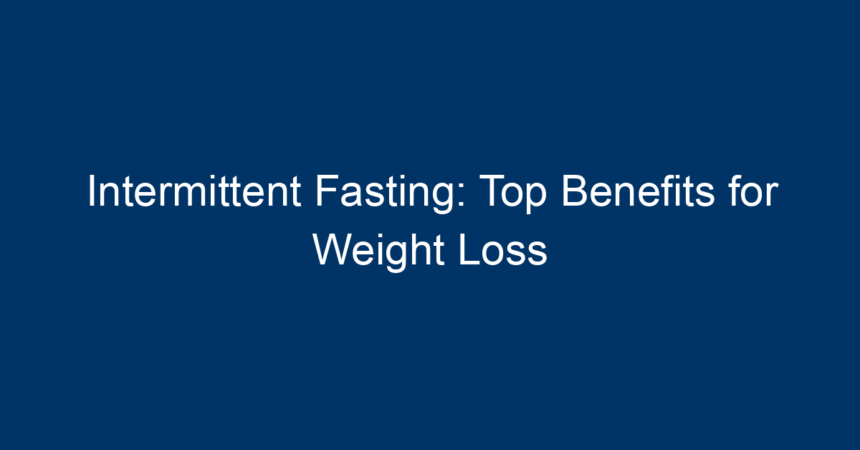Intermittent fasting (IF) has taken the health and fitness world by storm in recent years, emerging as one of the most popular dietary trends. Promising weight loss, improved metabolic health, and even longevity, it provides a flexible approach to eating that encourages not just dietary change but a shift in lifestyle. In this article, we will explore the top benefits of intermittent fasting for weight loss, how it works, and practical tips on how to get started.
What is Intermittent Fasting?
Intermittent fasting is not a diet in the traditional sense; rather, it’s an eating pattern that cycles between periods of eating and fasting. This method can take various forms, including:
- 16/8 Method: Fast for 16 hours and eat during an 8-hour window.
- 5:2 Diet: Eat normally for five days and limit caloric intake to about 500-600 calories on two non-consecutive days.
- Eat-Stop-Eat: Involves fasting for a full 24 hours once or twice a week.
What makes intermittent fasting particularly appealing is its simplicity. By restricting eating to specific time frames, individuals may find it easier to control calorie intake, making it a popular choice for weight loss.
The Science Behind Intermittent Fasting
How It Works
Intermittent fasting works by triggering various metabolic changes in the body. During fasting periods, your insulin levels drop, facilitating fat burning. Your body becomes more efficient at utilizing its fat stores for energy, ultimately leading to weight loss.
Hormonal Changes: Fasting alters hormone levels to facilitate weight loss:
- Insulin decreases, promoting fat breakdown.
- Norepinephrine increases, enhancing fat burning.
- Growth Hormone levels may increase as well, further aiding fat loss and muscle preservation.
Impact on Appetite
Research suggests that intermittent fasting might help regulate appetite. During fasting periods, the levels of ghrelin (the hunger hormone) may decrease, helping you feel less hungry. Additionally, many people report feeling more focused and energetic as a result of the hormonal changes that occur during fasting.
Top Benefits of Intermittent Fasting for Weight Loss
1. Effective for Short-Term Weight Loss
Studies indicate that intermittent fasting can result in significant weight loss in a short period. Many who adopt this eating method find they lose weight without feeling deprived. Since it encourages calorie restriction, it allows for a more manageable approach to reducing caloric intake.
2. Improved Metabolic Health
Intermittent fasting can lead to metabolic improvements, such as reduced blood sugar levels and improved insulin sensitivity. These changes not only aid in weight loss but also contribute to overall better health and lower risks of diseases such as type 2 diabetes.
3. Enhanced fat burning
The “fasting” state prompts your body to begin breaking down fat stores for energy, effectively leading to fat loss. Unlike traditional calorie restriction methods, intermittent fasting has been shown to preserve muscle mass while promoting fat loss, leading to a leaner, healthier body composition.
4. Convenient and Simple
One of the most attractive features of intermittent fasting is its simplicity. With fewer meals to plan, prepare, and eat, it can actually save time. This practicality allows individuals to integrate intermittent fasting into their routine without the burdensome restrictions often associated with traditional diets.
5. Sustainable Long-Term
Many fail to stick to restrictive diets in the long run. However, intermittent fasting offers flexibility. Once you adapt to the eating windows, it becomes second nature. This makes it easier to stick with the plan over time, leading to lasting weight loss.
6. Reduces Inflammation
Chronic inflammation is a root cause of many health issues, including obesity. Intermittent fasting has been linked to reduced levels of inflammatory markers in the body, supporting both weight loss and overall wellness.
7. Supports Brain Health
Interestingly, intermittent fasting may also promote brain health. The same protective mechanisms that may reduce inflammation can benefit brain function, reduce the risk of neurodegenerative diseases, and improve cognitive function.
8. Improves Longevity
Research indicates that practices similar to intermittent fasting can actually promote longevity. By triggering autophagy, a process where cells remove damaged components, intermittent fasting may help prolong life and promote overall well-being.
Getting Started with Intermittent Fasting
If you’re intrigued by the potential benefits of intermittent fasting, here are some practical steps to get started:
Choose Your Method
Determine which intermittent fasting method aligns best with your lifestyle. For beginners, the 16/8 method is often the easiest to adopt.
Gradual Transition
For some, jumping directly into fasting can be overwhelming. Consider starting with shorter fasting periods, such as 12-14 hours, and gradually work your way up to longer windows.
Stay Hydrated
During fasting periods, ensure you’re drinking plenty of water. Herbal teas and black coffee can also fill you up without breaking your fast.
Listen to Your Body
Pay attention to how you feel during the fasting periods. It’s crucial to maintain a balanced approach and not push your body beyond its limits.
Maintain a Balanced Diet
When it’s time to eat, focus on whole foods such as fruits, vegetables, lean proteins, and healthy fats. Avoid processed foods that can sabotage your weight loss efforts.
Track Your Progress
Consider keeping a journal to monitor your eating patterns, how you feel, and any changes in your weight or energy levels. This accountability can enhance your motivation.
Final Thoughts
Intermittent fasting presents a flexible and practical approach to weight loss that capitalizes on natural metabolic processes. With numerous health benefits beyond just shedding pounds, it serves as a holistic lifestyle choice that prioritizes overall well-being. As with any lifestyle change, always consult with a healthcare professional before starting, especially if you have underlying health conditions.
Embrace intermittent fasting, listen to your body, and discover a healthier you that thrives on balance and moderation. Whether you’re aiming for weight loss, better metabolic health, or enhanced longevity, intermittent fasting may offer the solution you’ve been searching for.




